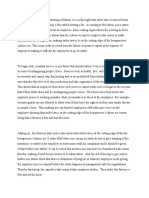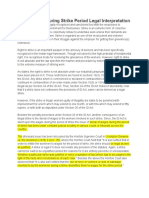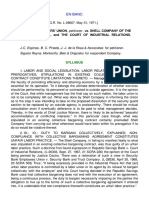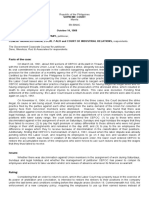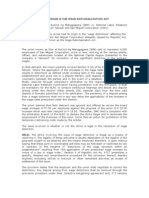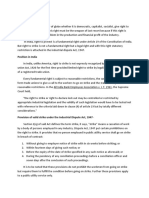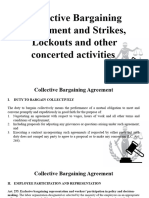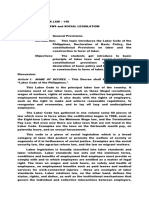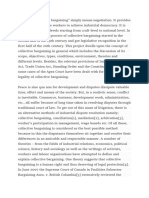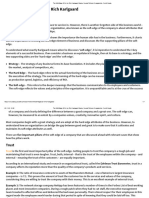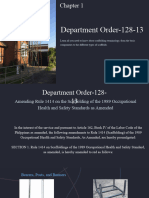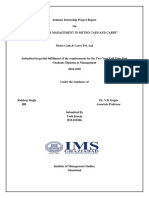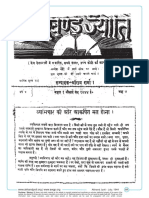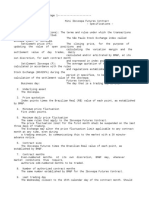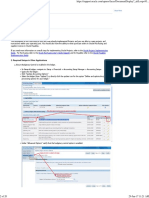Q.
N Strike law is at the cutting edge of the bourgeoisies' labour act,
the reason being that it favours the few and hurt the most.
Discuss.
The view that the strike law is at the cutting edge of the bourgeoisies labour act the reason being
that it favours the few and hurt the most is valid to a greater extent. The Zimbabwean labour act
(chapter 28.01) was meant by the capitalists as a way of protecting their interests at the expense
of labour, as far as the strike law is concerned. A strike according to Madhuku (2004) is a
temporal collective withdrawal or withholding of labour as a way of stopping production and
making the employer to take into consideration the demands of employees. However, Westfall
and Thsing (1999) say that, according to a commonly accepted definition, a legal strike in
Germany is the jointly and deliberately executed cessation of work by a number of employees
with the intention that they will resume work once they have successfully forced through their
demands in the form of the conclusion of a new collective agreement. It is therefore the duty of
the essay to show how the strike law favours the capitalists at the expense of labour that is the
workforce.
To begin with, the strike law is at the cutting edge of the bourgeoisies labour act the reason
being that it favours the few and hurt the most because of the fourteen days notice in the
Zimbabwean Labour Act (chapter 28.01). The fourteen days notice has it that for employees to
strike, they have to give fourteen days to the employer for him to find ways to solve their
grievances. This notice therefore favours the employers in the sense that it gives him time even
to retrench the employees who will be enforcing the strike. The fourteen days notice therefore
hurt the employees in the sense that workers are allowed to go for further fourteen days without
money to cater for their survival that is paying rent, electric and water supply bills. This
information therefore makes one safe to say that strike law is at the cutting edge of the
bourgeoisies labour act the reason being that it favours the few and hurt the most since it is
protecting employers interests at the expense of labour.
Furthermore, strike law is at the cutting edge of the bourgeoisies labour at the reason being that
if favours the few and hurt the most because of the essential service law. An essential service is a
service, the interruption of which endangers the life, personal safety or health of the whole or any
part of the population; (www.westerncape.gov.za/Text/2004/4/know_your_lra_chap7) and
�according to the Labour Act (chapter 28.01) these includes those in the health sector, army, fire
department as well as engineering. Employers are therefore favoured in this act by the fact that
those in the essential service are not allowed to go on strike since their absence in their areas of
operation may endanger peoples lives for example if those in the health sector go on strike, this
may result in an increase in the death rate due to the fact that the people will not have anyone to
care for their medical requirements. This prohibitation in striking therefore makes the employers
have an upper hand since the employees will be maximizing production for the employer even
though they will have some grievances on payment issues. A typical example of this exploitation
is the recent situation in Zimbabwe when those in the health sector and army were paid after an
extension of their pay day and they didnt go on strike since their professions are viewed as
essential. One is therefore made to agree with the notion that the strike law is at the cutting edge
of the bourgeoisies labour act the reason being that it favours a few and hurt the most.
Moreover, the view that the strike law is at the cutting edge of the bourgeoisies labour act the
reason being that it favours a few and hurt the most is valid due to the secret ballot law.
According to the law, there must be a 51% vote for whether people should go on strike or not.
However, the law favours the capitalists because most organisations have a greater percentage of
the management over that of the employees and in voting, it becomes an automatic win for the
management since it will consist of the 51% (www.webcralwer.com/info.wbcrwl). It therefore
becomes a disadvantage to the employees since they will not go for a strike due to the votes
results which will be in favour of the employers. This information therefore support the view that
the strike law is at the cutting edge of the bourgeoisies labour act the reason being that it favours
the few and hurt the most since it is in favour of the capitalists at the expense of labour that is the
employees.
Additionally, the assertion that the strike law is at the cutting edge of the bourgeoisies labour act
the reason being that it favours the few and hurt the most is also evidenced by the restrictive
regulation imposed by the capitalists on employees. Restrictive regulations like the Public Order
and Security Act (P.O.S.A) restrict people to gather at any place in a number exceeding four
people and this therefore favours the employers in the view that the no strikes will be exerted
upon him by the employees if he fails to meet the demands of the employees. According to the
Labour Act (chapter 28.01), employees have a right of picketing and in this case they are hurt by
�the restrictive law of P.O.S.A which prohibits them from meeting in groups hence resulting to the
challenge of the employees right of picketing. This therefore contributes to the validity of the
view that the strike law is at the cutting edge of the bourgeoisies labour act the reason being that
it favours the few and hurt the most.
The registration of Trade Unions is another restrictive provision to the right to strike which
favours the employer more than the employee. According to the Zimbabwean Labour Act
(chapter 28.01), no unregistered Trade Union or employers organisation may in its corporate
name or otherwise recommend collective job action that is strike. It must be noted that not all
employees belong to any Trade Union for example those employees in the private sectors like
Mupfumi Tours drivers and Great Zimbabwe University security guards and the cleaning
department. This then becomes an advantage to the employer since his/her employees will not be
allowed to strike since they will not be members of any registered Trade Union. This law then
leaves employees at the mess of their employer since they will not be permitted to strike by the
fact that they may not be in any registered Trade Union. This information therefore brings home
the fact that the strike law is at the cutting edge of the bourgeoisies labour Act the reason being
that it favours the few and hurt the most.
Strike law is at the cutting edge of the bourgeoisies labour act the reason being that it favours
the few and hurt the most since employees are prohibited to strike over the dispute of right. The
Zimbabwean Labour Act (chapter 28.01) has it that employees have the right to work on good
working conditions and the right to be paid. However, the law has it that employees only resort
to a strike only if it is a dispute of interests that is the enforcement of higher wages which may
rise out of employment relationship. The law therefore benefit the capitalists in the sense that if
their deprive employees rights of payment, employees are not allowed to strike thereby
favouring the capitalists at the expense of labour that is the employees. This information then
shows that the strike law is at the cutting edge of the bourgeoisies labour act the reason being
that it favours the few and hurt the most.
Additionally, strike law is at the cutting edge of the bourgeoisies labour act the reason being that
it favours the few and hurt the most due to the fact that employees has to follow the process of
conciliation, mediation and arbitration before they go on strike. Employers benefit from this law
in the sense that they take time to respond to the grievances of the employees due to the
�bureaucratic nature of the law. The employers therefore use the law to exploit workers by
terminating employment contracts to the employees before the Minister of Labour. For
employees not to go through this bureaucratic process and they are forced not to strike hence
benefiting the organisation at the expense of their grievances. This then becomes clear evidence
that strike law is at the cutting edge of the bourgeoisies labour act the reason being that it
favours the few and hurt the most.
However, it must also be put into consideration that not all legislations are restrictive to
employees since employees are given the right to strike in some conditions which will need
immediate strike action regardless of the legislations. When employees are exposed to hazardous
conditions like air pollution and toxic gases in mining industries, there is no need for the 14 days
notice or going through the process of conciliation, mediation and arbitration since these working
conditions call for immediate strike which needs urgent an response from the employer. This
then shows that the labour act though it restricts employees from striking, in this case employees
have to strike since it is an issue to do with their health safety.
Furthermore, the Labour Act also protects the employees in terms of strike action considering the
fact that it approve the employees their right to remuneration (Gwisai, 2006). This means that the
employer is obliged to pay the employees even if they have gone for strike. The employer can
only discontinue such payments only if the employer declines the remuneration. Therefore
employees are left with something that can help them survive until they return to their respective
duties. Therefore, this is how the Labour Act favours the employees during strike. Therefore,
Labour Act can be protective over the employees against the employers who would want to take
advantage of the employees.
More so, the labour act is also protective on the employees in the sense that it hinders the
employer from replacing an employee who has gone for strike form work with another employer
(Mucheche, 2013). The absence of a right to strike clearly means that failure to report to work in
pursuance of a strike objective amount to a breach of contracts under the common law. This
would entitle the employer under the common to summarize dismissal. However, the labour act
protects the employees from being replaced. According to the Labour Act Chapter 28.01 Section
108 it is stated that An employer may not employ any person for the purpose of performing of
an employee who is locked out. Thus there is no way an employer can employ another person in
�place of someone since it is against the law. Therefore, this clearly shows us how the Labour Act
protects the employees on strike action.
Conclusively, strike law is at the cutting edge of the bourgeoisies labour act, the reason being
that it favours the few and hurt the most because of the laws like the fourteen days notice, the
fact of the essential service which is not allowed to strike among others discussed in the essay.
However, the labour law has other laws which protect the employees from the mess of their
employers. These include that employees are given the right to strike in some conditions which
will need immediate strike action as well as hindering the employer from replacing an employee
who has gone for strike among others discussed in the essay.
�REFERENCES
Gwisai, M. (2006). Labour and Empowerment Law in Zimbabwe Relations of Work Under Neo
colonial Capitalism. Government Printers. Harare.
Labour Act [CHAPTER 28:01] And Selected Regulations (Updated to incorporate all
amendments in force as at 20th October, 2006).
Madhuku; L. (2004)
Mucheche, C.B. (2013). A Practical Guide to Labour Law in Zimbabwe 1st edition. Molhurst
Printers. Harare.
Westfall; D. and Thsing; G. (1999), Strikes and Lockouts in Germany and Under Federal
Legislation in the United States: A Comparative Analysis, 22 B.C. Int'l & Comp. L. Rev. 29
http://webcrawler.com/blog/2011/04/employees'-rights-to-strike/
http://westerncape.gov.za/Text/2004/4/know-your-lra-chap7/
�Motto: A reader lives a thousand lives before he dies. The man who never reads lives only one life!!!!!
